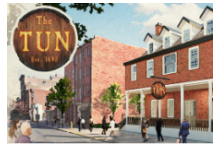The Tun Tavern Legacy Foundation, Inc. is a registered 501(c)(3) non-profit organization formed by members of these organizations with origins at Tun Tavern that are still in existence:
-United States Marines (1775)
-Pennsylvania Freemasons (1731)
-St. Andrew’s Society (1747)
-Society of St. George (1729)
-The Friendly Sons and Daughters of St. Patrick (1771)
United States Navy (1775)
That place was The Tun Tavern, often referred to in ... 阅读更多
The Tun Tavern Legacy Foundation, Inc. is a registered 501(c)(3) non-profit organization formed by members of these organizations with origins at Tun Tavern that are still in existence:
-United States Marines (1775)
-Pennsylvania Freemasons (1731)
-St. Andrew’s Society (1747)
-Society of St. George (1729)
-The Friendly Sons and Daughters of St. Patrick (1771)
United States Navy (1775)
That place was The Tun Tavern, often referred to in historical records as simply “The Tun”. Initially opened in 1693 as what would today be called a microbrewery, it was one of the first taverns erected in the new settlement of Philadelphia. Initially built by Master Brewer Joshua Carpenter, with the help of his brother Samuel Carpenter, The Tun had a reputation for the finest beer in Philadelphia. The demand for Joshua Carpenter’s beer was so strong that after operating The Tun for only about three months, he decided to lease the tavern to someone else to focus on his passion – crafting the finest beer and ale. It was a good decision, as Joshua Carpenter was considered one of the wealthiest men in Philadelphia at his death in 1722. Between them, the Carpenter brothers owned four taverns and/or “coffee houses” (coffee and tea on the first floor, beer and spirits on the second). Joshua Carpenter’s businesses were so successful that he was one of the principal founders and financers of Christ Church in Philadelphia, a structure that still stands today.
The tavern changed hands multiple times over the next few decades, and it was under the management of a widow, Mary Campion, in the 1730s that it gained a reputation for good food. By the 1740’s it was run by the Mullan Family and furthered its reputation as the best place to get a meal in Philadelphia under the moniker “Peg Mullan’s Beefsteak Club”.
Yet, as popular a “destination” as it was in the 1700s, the tavern had fallen into disrepair after standing nearly one hundred years and was razed in 1781, disappearing from the Delaware waterfront but never from the collective memories of the members of organizations that share a common heritage at The Tun.
隐藏完整文本